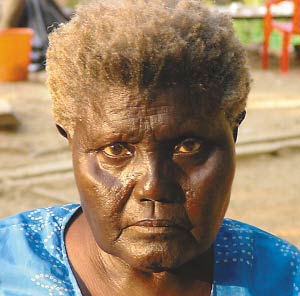 A file photo of Boa Sr. One of the world's oldest dialects, which traces its origins to tens of thousands of years ago, has become extinct after the last person to speak it died on a remote Indian island.
|
|
One of the world's oldest dialects, which traces its origins to tens of thousands of years ago, has become extinct after the last person to speak it died on a remote Indian island. Boa Sr, the 85-year-old last speaker of "Bo," was the oldest member of the Great Andamanese tribe, R.C. Kar, deputy director of Tribal Health in Andaman, told reporters on Friday. She died last week in Port Blair, the capital of Andaman and Nicobar Islands, which were hit by a devastating tsunami in 2004. "With the death of Boa Sr and the extinction of the Bo language, a unique part of human society is now just a memory," said Stephen Corry, director of Survival International, an organization that supports tribes worldwide. "Boa's loss is a bleak reminder that we must not allow this to happen to the other tribes of the Andaman Islands," he said in a statement. Kar said Bo was one of the ten dialects used by the Great Andamanese tribe. According to Survival International, there are now only 52 members surviving members of the tribe, which is thought to have lived on the Andaman Islands for as many as 65,000 years, making them descendants of one of the oldest cultures in the world. The Great Andamanese had the biggest population of all the island tribes until the early 20th century. Originally 10 distinct tribes, the Great Andamanese were 5,000-strong when the British colonized the Andaman Islands in 1858. Most were killed or died of diseases brought by the colonizers, Survival International said. The surviving Great Andamanese depend largely on the Indian government for handouts and alcohol abuse is rife. The cluster of more than 550 Andaman and Nicobar islands, of which only about three dozen are inhabited, are home to six tribes of Mongoloid and African origin, who have lived there for thousands of years. The current home of the Great Andamanese is Strait Island, a small island of Middle Andaman Region. (Read by Lee Hannon. Lee Hannon is a multimedia journalist at the China Daily Web site.) 點擊查看更多雙語新聞
|
日前,世界最古老的一門語言隨著印度某偏遠島嶼上一名老婦的離世而失傳。該語言有著數萬年歷史,這名老婦是最后一個會說該語言的人。 這位名叫波阿的老婦是會說波族語的最后一人,也是大安達曼部落年齡最大的成員,安達曼衛生部副主任R.C.卡爾上周五接受記者采訪時稱。 波阿于上周在安達曼?尼科巴群島的首府布萊爾港去世。該島于2004年遭受了海嘯的毀滅性襲擊。 為世界各地的部落提供支持的“生存國際”組織的主管史蒂芬?科里說:“隨著波阿的離世和波族語的消亡,人類社會的一支奇葩現已成為回憶。” 他在一份聲明中說:“波阿的去世讓我們認識到,不能讓悲劇在安達曼島嶼的其它部落重演。” 卡爾稱,波族語是大安達曼部落使用的十種語言之一。 “生存國際”組織稱,大安達曼部落已在安達曼群島生活了6萬5千年之久,目前僅有52個成員,所以“大安達曼人”堪稱世界最古老的人類文化遺民之一。 直到20世紀初期,大安達曼人一直是所有群島部落中人數最多的部落。 大安達曼人原分10個部落,在1858年安達曼島淪為英國殖民地時共有五千名成員。但據“生存國際”組織介紹,在這之后,多數部落成員被殺害,或死于殖民者帶來的疾病。 目前,大安達曼人主要依靠印度政府的救濟度日,原住居民酗酒的情況很普遍。 安達曼?尼科巴群島由550多個島嶼組成,其中僅有大約30多個島嶼有人居住。該群島上生活著六個古老部落,這些部落是蒙古或非洲人種,已經此生活了數千年。 大安達曼部落目前居住在中安達曼的一個名叫海峽島的小島上。 相關閱讀 (中國日報網英語點津 Julie 編輯蔡姍姍) |
|
Vocabulary: handout:a portion of food or the like given to a needy person(救濟) rife:of common or frequent occurrence; prevalent; in widespread existence, activity, or use(普遍的) |
